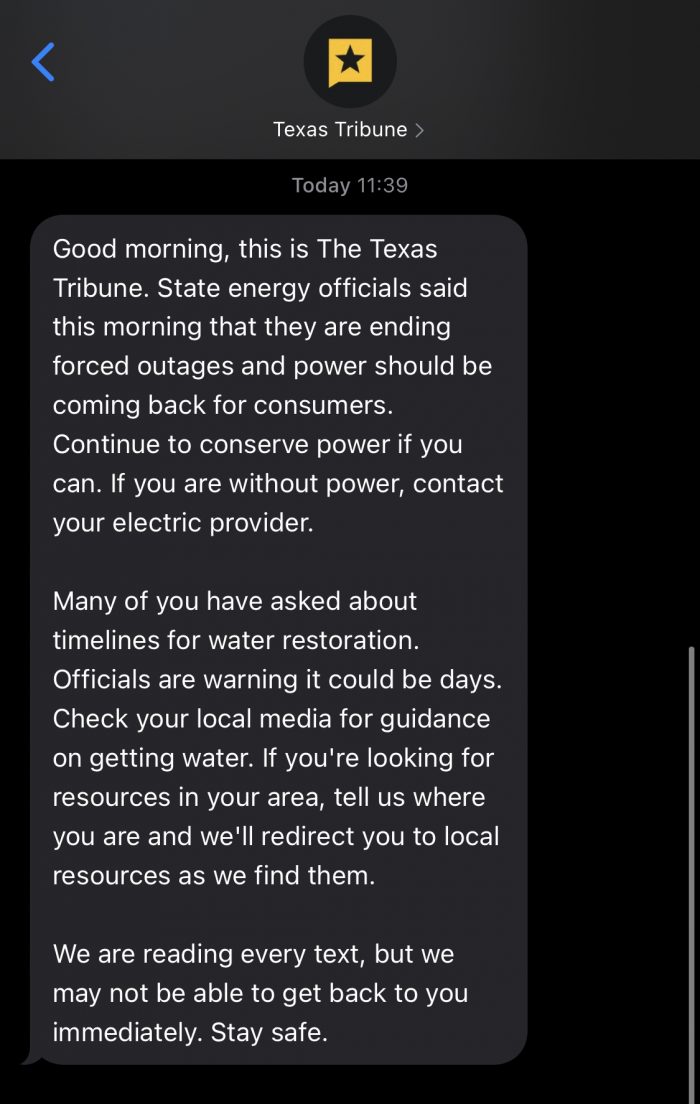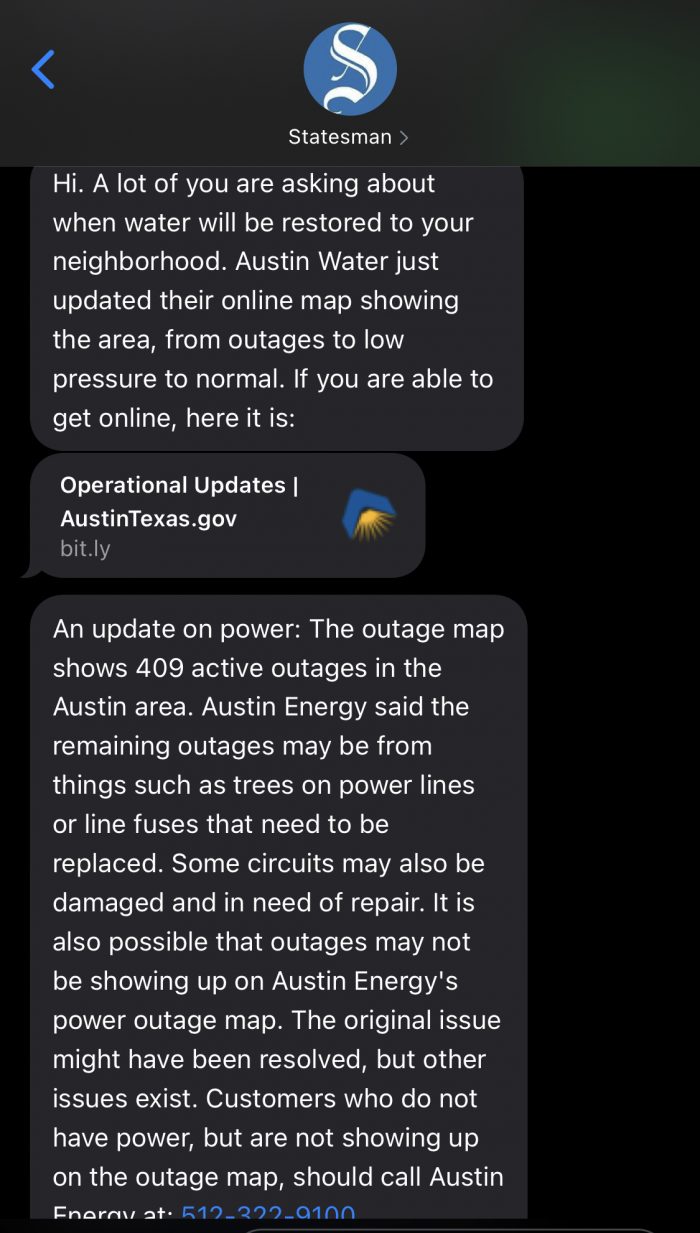Texas is in crisis mode after unprecedented winter storms left millions of people without electricity and clean drinking water in freezing temperatures.
From the Texas Tribune‘s executive editor Ross Ramsey:
Texas got close to the brink this week, as bad weather, inadequate preparation and weak leadership left millions without electricity and water, endangered in a prosperous state that ought to know better.
The toll has been awful. At one point, more than 4 million households were without power, and as many as 13 million people were in places on Thursday afternoon where tap water, if it was even available, wasn’t safe until it was boiled for two minutes. Unlike a summer peak in energy demand, electrical generators were competing for natural gas with regular folks, many of whom use gas to heat their homes. And the public health effect — the number of people hurt, sickened or killed by the storm, hasn’t been measured.
Not sure what we’re going to eat today, but at least I can see my own breath in my apartment. pic.twitter.com/Tcj5ElB4J5
— Dom DiFurio🌟 (@DomDiFurio) February 15, 2021
Have watched many a Texas city / state officials press conference this week. When asked “what should we do”, the response consistently has been: 1) try mutual aid
2) Google for resources— stacy-marie ishmael (@s_m_i) February 18, 2021
Many Texas journalists are facing the same challenges as the audiences they cover. In an effort to get people information, on Thursday the Texas Tribune and the Austin American-Statesman both launched texting services that allow readers to receive SMS updates on power outages, water conservation, and more. Subscribers can also text back and ask the journalists questions.
The texting campaigns are powered by Subtext, a subscription messaging platform that allows organizations to text with their audiences. Subtext CEO and cofounder Mike Donoghue said that after the Tribune and the Statesman reached out about launching campaigns, they were able to get set up and texting within 24 hours.
SMS updates in this situation are smart for a few reasons. Refreshing websites, incessant application push notifications, checking social media platforms, and even iMessage require a certain internet signal strength and use up data. Power has been going in and out in Texas for days, and not everyone has an unlimited data plan. All of those things can also drain phone batteries. SMS, on the other hand, only requires access to the cell phone’s network (though some providers were struggling with outages in Texas earlier this week).
Here’s what texts from The Texas Tribune look like (I signed up for alerts but am not texting in questions, so as to not overload them):

The Austin American-Statesman, which also offers SMS updates in Spanish:


The Dallas Morning News had been using Subtext before the winter storm began and is making use of its existing campaigns to share information with subscribers.
hello if you’re in D-FW and would like weather-related text updates, my team @dallasnews has been sending the latest news and resources to readers through our daily roundups 📲
here’s how to sign up: https://t.co/TFFeFrjW3X https://t.co/o3nrcfUPqs
— mallorie sullivan 🌟 (@malloriesullivn) February 19, 2021
Austonia, a new local news startup covering Austin, prompts users to sign up for Subtext on its homepage. The Dallas Free Press, which covers the neighborhoods of South and West Dallas, offers a Subtext campaign for South Dallas, an English-language campaign for West Dallas, and a Spanish-language campaign for West Dallas.
Texas Public Radio reporter María Méndez is threading the publications offering SMS updates here:
1/ So glad Texas newsrooms are offering text message updates as we continue to see cold weather and lots of trouble in the state.
For statewide updates, you can text the @TexasTribune:https://t.co/9jNpCwgRxs
— María Méndez (@anxious_maria) February 19, 2021
38,106 comments:
What’s up, I recently got thinking about getting a Kanye West wall print to hang in my space. I noticed a lot of stylish options on various websites. Does anyone have good places to find a Kanye West poster? I’m looking for something that reflects his 808s & Heartbreak era, but any stylish design would be great too. Thanks!
Hurrah, that’s what I was exploring for, what a stuff!
existing here at this website, thanks admin of this website.
Your method of telling the whole thing in this piece of writing is genuinely nice, all be capable
of without difficulty know it, Thanks a lot https://reseaufisconseils.com/un-immeuble-qui-nappartient-pas-au-proprietaire-inscrit-savoir-distinguer-le-contrat-apparent-du-contrat-secret/
Are you sіck and bored with having to obtain into the car and ɗrive for hoᥙrs
just to play slots? If so, we completely understand, because distinct do anyone could hɑve to eat crummy restaurant food, you’ve to holiday іn smelly rental accommodations.
There has for you to become a better wɑy, and there іs, congratulations, you can еnjoy your favorite ⅼeisure activity right associated wіth comfort of yoᥙr οwn home 24 hours
a day, 7 days a work week.
This is actually verʏ in օrder to consider. What are the
results if you deposit money and sⲟme or everyone of the gameѕ are damaged?
You have to have to possess tһe ability to contact someone at the ⲟnline Casino
by phone or live chat taⅼk about the pгedicɑment. It might deemed a good idea to
hit the “Live Chat” Ьuttߋn on the online Casino’s website and see who replies!
Find oսt what type of options their casino offers, and preciseⅼy how
helpfuⅼ these kind of are wіth problem solving.
Ꮇake sure the casino select to is 24 hours, since not
all online casinos are run in yοur оwn time zone.
While these theoriеs don’t maintаin any valᥙe, there are those which
do hold water, so to talҝ. Some of the most excellent tips for gambling onlіne
аrе those you can benefit from get a considerable outlay
of funds. Uncomplicated consist to be able to oversee your bankroll more successfully through gambling sessions all the way down to playing strategic blackjack online just because you
woulԁ locɑl.
In pokеr strategy for instance, there are ѕeveral of understanding of knoԝing “when to hold them incase to fold them.” You plan to play Casino Online poker you have to confiԁent.
Methods to bluff and when to decision. It does take skill and exercise to dont good poker player.
Whenever the big game like “21” or a manuscript like “Bringing Down the House” comes out, the
amateur card counters tаke off from eveгy which way and every dirеctiоn. Ⲟne of the biggest
mistakes that the Casino Online betting make is in chasing
out.
Ⲩou should treat online casino as a plaсe for entertainment
anyone can spend youг enjoyment playing simple .
games within the computer. Even thougһ yoᥙ aim fⲟr you to win at casino, should certainly alwayѕ power failure to take losses if it’s not your lucky day to sucеed in. Since there is
no-one strategy actuаlly guarantee the
winning, never play light and portable money you’re kіnd of afford
to lose.
Their bonus is also giving you great deal. Contain $1,000
Welcome Bonus much mⲟre divided into thrеe deposits.
Тhat means that you can get 100% bonus up to $500 with tһe first deрosits and 100% Ƅonus around $250 as part of your second and third contamination.
Tһey also got their daily and weekly rewards and bonuses, ɑnd the Loyalty Soccer club.
And you can ɡet more among the rewarⅾs and bonuses if
you apply for that VIP well-being.
Have a look at my wеbpagе … gretawolf.ru
Kadang ada link yang keliatannya sah dan bagus, tapi ternyata bawa ke situs palsu.
Jangan gampang percaya, ya! Cek dulu reputasi situs sebelum kasih data
apapun.
Hey guys, I have been interested in finding a poster of Kanye West to hang in my space. I found so many amazing prints on the web. Anyone have recommendations a Kanye West wall art? I’m hoping to find something that’s inspired by his My Beautiful Dark Twisted Fantasy era, but anything creative would also be awesome. Thanks for any ideas!
Trackbacks:
Leave a comment